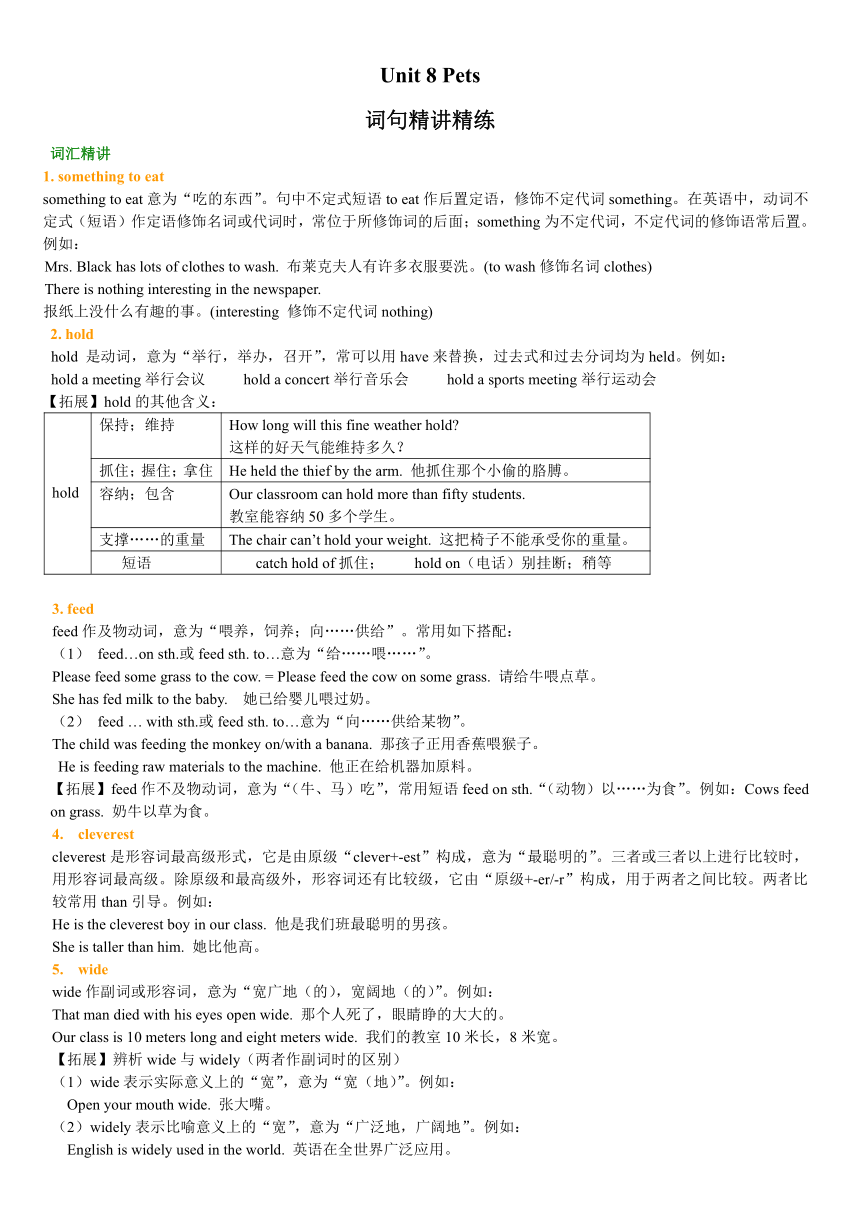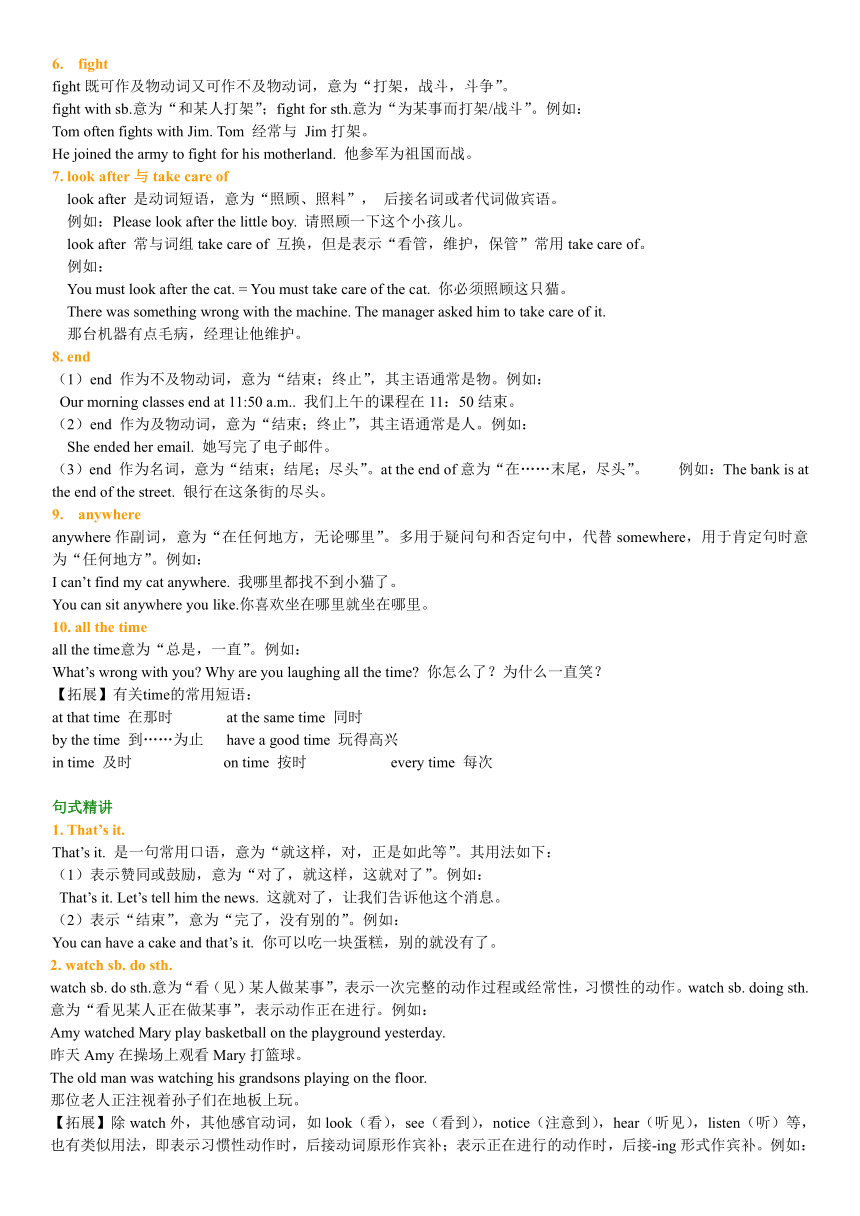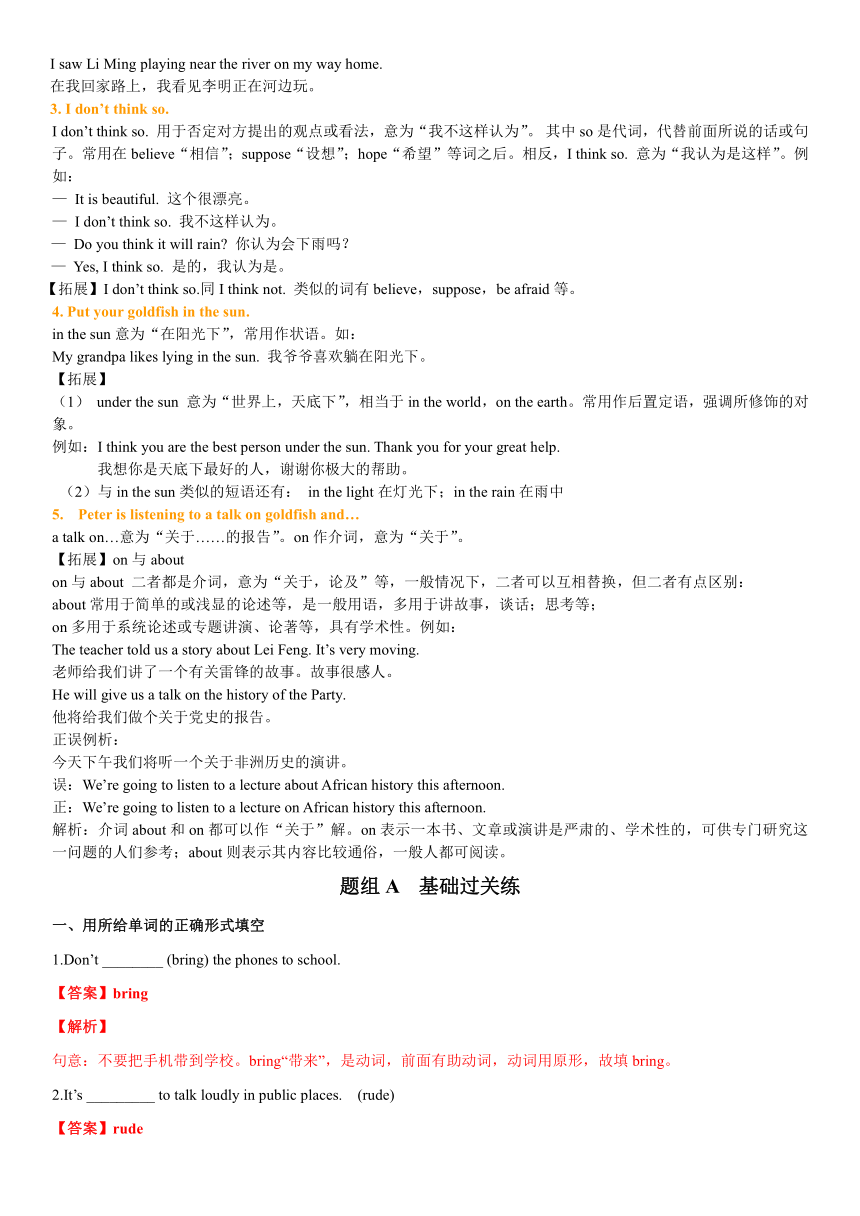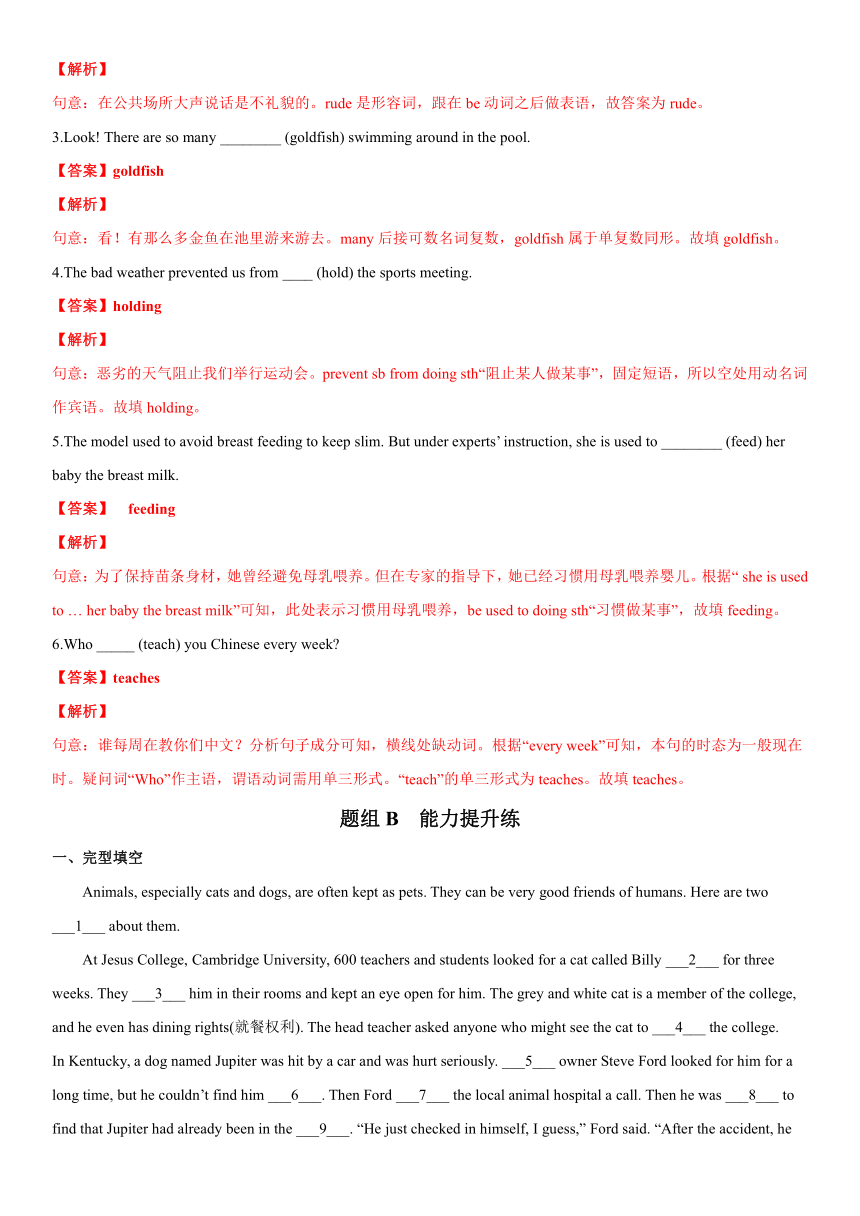Unit 8 Pets 词句精讲精练(含解析)牛津译林版英语七年级下册
文档属性
| 名称 | Unit 8 Pets 词句精讲精练(含解析)牛津译林版英语七年级下册 |

|
|
| 格式 | docx | ||
| 文件大小 | 35.5KB | ||
| 资源类型 | 教案 | ||
| 版本资源 | 牛津译林版 | ||
| 科目 | 英语 | ||
| 更新时间 | 2024-06-16 14:14:37 | ||
图片预览




文档简介
Unit 8 Pets
词句精讲精练
词汇精讲
1. something to eat
something to eat意为“吃的东西”。句中不定式短语to eat作后置定语,修饰不定代词something。在英语中,动词不定式(短语)作定语修饰名词或代词时,常位于所修饰词的后面;something为不定代词,不定代词的修饰语常后置。例如:
Mrs. Black has lots of clothes to wash. 布莱克夫人有许多衣服要洗。(to wash修饰名词clothes)
There is nothing interesting in the newspaper.
报纸上没什么有趣的事。(interesting 修饰不定代词nothing)
2. hold
hold 是动词,意为“举行,举办,召开”,常可以用have来替换,过去式和过去分词均为held。例如:
hold a meeting举行会议 hold a concert举行音乐会 hold a sports meeting举行运动会
【拓展】hold的其他含义:
hold 保持;维持 How long will this fine weather hold
这样的好天气能维持多久?
抓住;握住;拿住 He held the thief by the arm. 他抓住那个小偷的胳膊。
容纳;包含 Our classroom can hold more than fifty students.
教室能容纳50多个学生。
支撑……的重量 The chair can’t hold your weight. 这把椅子不能承受你的重量。
短语 Catc catch hold of抓住; hold on(电话)别挂断;稍等
3. feed
feed作及物动词,意为“喂养,饲养;向……供给”。常用如下搭配:
(1) feed…on sth.或feed sth. to…意为“给……喂……”。
Please feed some grass to the cow. = Please feed the cow on some grass. 请给牛喂点草。
She has fed milk to the baby. 她已给婴儿喂过奶。
(2) feed … with sth.或feed sth. to…意为“向……供给某物”。
The child was feeding the monkey on/with a banana. 那孩子正用香蕉喂猴子。
He is feeding raw materials to the machine. 他正在给机器加原料。
【拓展】feed作不及物动词,意为“(牛、马)吃”,常用短语feed on sth.“(动物)以……为食”。例如:Cows feed on grass. 奶牛以草为食。
cleverest
cleverest是形容词最高级形式,它是由原级“clever+-est”构成,意为“最聪明的”。三者或三者以上进行比较时,用形容词最高级。除原级和最高级外,形容词还有比较级,它由“原级+-er/-r”构成,用于两者之间比较。两者比较常用than引导。例如:
He is the cleverest boy in our class. 他是我们班最聪明的男孩。
She is taller than him. 她比他高。
wide
wide作副词或形容词,意为“宽广地(的),宽阔地(的)”。例如:
That man died with his eyes open wide. 那个人死了,眼睛睁的大大的。
Our class is 10 meters long and eight meters wide. 我们的教室10米长,8米宽。
【拓展】辨析wide与widely(两者作副词时的区别)
(1)wide表示实际意义上的“宽”,意为“宽(地)”。例如:
Open your mouth wide. 张大嘴。
(2)widely表示比喻意义上的“宽”,意为“广泛地,广阔地”。例如:
English is widely used in the world. 英语在全世界广泛应用。
fight
fight既可作及物动词又可作不及物动词,意为“打架,战斗,斗争”。
fight with sb.意为“和某人打架”;fight for sth.意为“为某事而打架/战斗”。例如:
Tom often fights with Jim. Tom 经常与 Jim打架。
He joined the army to fight for his motherland. 他参军为祖国而战。
7. look after与take care of
look after 是动词短语,意为“照顾、照料”, 后接名词或者代词做宾语。
例如:Please look after the little boy. 请照顾一下这个小孩儿。
look after 常与词组take care of 互换,但是表示“看管,维护,保管”常用take care of。
例如:
You must look after the cat. = You must take care of the cat. 你必须照顾这只猫。
There was something wrong with the machine. The manager asked him to take care of it.
那台机器有点毛病,经理让他维护。
8. end
(1)end 作为不及物动词,意为“结束;终止”,其主语通常是物。例如:
Our morning classes end at 11:50 a.m.. 我们上午的课程在11:50结束。
(2)end 作为及物动词,意为“结束;终止”,其主语通常是人。例如:
She ended her email. 她写完了电子邮件。
(3)end 作为名词,意为“结束;结尾;尽头”。at the end of意为“在……末尾,尽头”。 例如:The bank is at the end of the street. 银行在这条街的尽头。
anywhere
anywhere作副词,意为“在任何地方,无论哪里”。多用于疑问句和否定句中,代替somewhere,用于肯定句时意为“任何地方”。例如:
I can’t find my cat anywhere. 我哪里都找不到小猫了。
You can sit anywhere you like.你喜欢坐在哪里就坐在哪里。
10. all the time
all the time意为“总是,一直”。例如:
What’s wrong with you Why are you laughing all the time 你怎么了?为什么一直笑?
【拓展】有关time的常用短语:
at that time 在那时 at the same time 同时
by the time 到……为止 have a good time 玩得高兴
in time 及时 on time 按时 every time 每次
句式精讲
1. That’s it.
That’s it. 是一句常用口语,意为“就这样,对,正是如此等”。其用法如下:
(1)表示赞同或鼓励,意为“对了,就这样,这就对了”。例如:
That’s it. Let’s tell him the news. 这就对了,让我们告诉他这个消息。
(2)表示“结束”,意为“完了,没有别的”。例如:
You can have a cake and that’s it. 你可以吃一块蛋糕,别的就没有了。
2. watch sb. do sth.
watch sb. do sth.意为“看(见)某人做某事”,表示一次完整的动作过程或经常性,习惯性的动作。watch sb. doing sth.意为“看见某人正在做某事”,表示动作正在进行。例如:
Amy watched Mary play basketball on the playground yesterday.
昨天Amy在操场上观看Mary打篮球。
The old man was watching his grandsons playing on the floor.
那位老人正注视着孙子们在地板上玩。
【拓展】除watch外,其他感官动词,如look(看),see(看到),notice(注意到),hear(听见),listen(听)等,也有类似用法,即表示习惯性动作时,后接动词原形作宾补;表示正在进行的动作时,后接-ing形式作宾补。例如:
I saw Li Ming playing near the river on my way home.
在我回家路上,我看见李明正在河边玩。
3. I don’t think so.
I don’t think so. 用于否定对方提出的观点或看法,意为“我不这样认为”。 其中so是代词,代替前面所说的话或句子。常用在believe“相信”;suppose“设想”;hope“希望”等词之后。相反,I think so. 意为“我认为是这样”。例如:
— It is beautiful. 这个很漂亮。
— I don’t think so. 我不这样认为。
— Do you think it will rain 你认为会下雨吗?
— Yes, I think so. 是的,我认为是。
【拓展】I don’t think so.同I think not. 类似的词有believe,suppose,be afraid等。
4. Put your goldfish in the sun.
in the sun意为“在阳光下”,常用作状语。如:
My grandpa likes lying in the sun. 我爷爷喜欢躺在阳光下。
【拓展】
(1) under the sun 意为“世界上,天底下”,相当于in the world,on the earth。常用作后置定语,强调所修饰的对象。
例如:I think you are the best person under the sun. Thank you for your great help.
我想你是天底下最好的人,谢谢你极大的帮助。
(2)与in the sun类似的短语还有: in the light在灯光下;in the rain在雨中
Peter is listening to a talk on goldfish and…
a talk on…意为“关于……的报告”。on作介词,意为“关于”。
【拓展】on与about
on与about 二者都是介词,意为“关于,论及”等,一般情况下,二者可以互相替换,但二者有点区别:
about常用于简单的或浅显的论述等,是一般用语,多用于讲故事,谈话;思考等;
on多用于系统论述或专题讲演、论著等,具有学术性。例如:
The teacher told us a story about Lei Feng. It’s very moving.
老师给我们讲了一个有关雷锋的故事。故事很感人。
He will give us a talk on the history of the Party.
他将给我们做个关于党史的报告。
正误例析:
今天下午我们将听一个关于非洲历史的演讲。
误:We’re going to listen to a lecture about African history this afternoon.
正:We’re going to listen to a lecture on African history this afternoon.
解析:介词about和on都可以作“关于”解。on表示一本书、文章或演讲是严肃的、学术性的,可供专门研究这一问题的人们参考;about则表示其内容比较通俗,一般人都可阅读。
题组A 基础过关练
用所给单词的正确形式填空
1.Don’t ________ (bring) the phones to school.
【答案】bring
【解析】
句意:不要把手机带到学校。bring“带来”,是动词,前面有助动词,动词用原形,故填bring。
2.It’s _________ to talk loudly in public places. (rude)
【答案】rude
【解析】
句意:在公共场所大声说话是不礼貌的。rude是形容词,跟在be动词之后做表语,故答案为rude。
3.Look! There are so many ________ (goldfish) swimming around in the pool.
【答案】goldfish
【解析】
句意:看!有那么多金鱼在池里游来游去。many后接可数名词复数,goldfish属于单复数同形。故填goldfish。
4.The bad weather prevented us from ____ (hold) the sports meeting.
【答案】holding
【解析】
句意:恶劣的天气阻止我们举行运动会。prevent sb from doing sth“阻止某人做某事”,固定短语,所以空处用动名词作宾语。故填holding。
5.The model used to avoid breast feeding to keep slim. But under experts’ instruction, she is used to ________ (feed) her baby the breast milk.
【答案】 feeding
【解析】
句意:为了保持苗条身材,她曾经避免母乳喂养。但在专家的指导下,她已经习惯用母乳喂养婴儿。根据“ she is used to … her baby the breast milk”可知,此处表示习惯用母乳喂养,be used to doing sth“习惯做某事”,故填feeding。
6.Who _____ (teach) you Chinese every week
【答案】teaches
【解析】
句意:谁每周在教你们中文?分析句子成分可知,横线处缺动词。根据“every week”可知,本句的时态为一般现在时。疑问词“Who”作主语,谓语动词需用单三形式。“teach”的单三形式为teaches。故填teaches。
题组B 能力提升练
完型填空
Animals, especially cats and dogs, are often kept as pets. They can be very good friends of humans. Here are two ___1___ about them.
At Jesus College, Cambridge University, 600 teachers and students looked for a cat called Billy ___2___ for three weeks. They ___3___ him in their rooms and kept an eye open for him. The grey and white cat is a member of the college, and he even has dining rights(就餐权利). The head teacher asked anyone who might see the cat to ___4___ the college.
In Kentucky, a dog named Jupiter was hit by a car and was hurt seriously. ___5___ owner Steve Ford looked for him for a long time, but he couldn’t find him ___6___. Then Ford ___7___ the local animal hospital a call. Then he was ___8___ to find that Jupiter had already been in the ___9___. “He just checked in himself, I guess,” Ford said. “After the accident, he ran about a mile to the hospital. ____10____, the car didn’t hurt his bones.”
1.A.news B.stories C.books D.accidents
2.A.carefully B.carelessly C.calmly D.angrily
3.A.looked at B.watched out C.looked for D.find out
4.A.call B.help C.find D.watch
5.A.Its B.His C.Her D.Their
6.A.anywhere B.somewhere C.nowhere D.everywhere
7.A.rang B.gave C.phoned D.made
8.A.bored B.surprised C.worried D.shocked
9.A.home B.hospital C.house D.room
10.A.Luckily B.Actually C.Probably D.Finally
【答案】1-5 BACAB 6-10 ABBBA
【文章大意】
本文主要讲的是动物,特别是猫和狗,经常被作为宠物饲养,他们是人的非常好的朋友,作者列举了两个真实的关于猫和狗与主人之间的故事。
【解析】
1.句意:这里有两个关于它们的故事。news新闻,消息;stories故事;books书;accidents事故。根据后文内容可知,介绍了两个故事,故选B。
2.句意:在剑桥大学耶稣学院,600名师生花了三个星期仔细地寻找一只叫比利的猫。
carefully仔细地;carelessly粗心地;calmly冷静地,平静地;angrily生气地。根据“600 teachers and students looked for a cat called Billy...for three weeks.”可知,是仔细地寻找一只叫比利的猫,故选A。
3.句意:他们在自己的房间里寻找他,并密切注意着他。looked at看;watched out小心;looked for寻找;find out查明。根据“600 teachers and students looked for a cat called Billy”可知,是寻找猫,故选C
4.句意:校长让任何可能看到这只猫的人给学校打电话。call打电话;help帮助;find找到;watch观看。根据“Then Ford...the local animal hospital a call.”可知,是打电话给学校,故选A。
5.句意:它的主人史蒂夫·福特找了它很长时间,但他到处都找不到它。Its它的;His他的;Her她的;Their他们的。根据“looked for him”可知,是男“他”,此处用his修饰owner,故选B。
6.句意:它的主人史蒂夫·福特找了它很长时间,但他到处都找不到它。anywhere任何地方;somewhere某处;nowhere无处;everywhere到处。根据“but he couldn’t find him...”可知,此处是否定句,用anywhere,故选A。
7.句意:然后福特给当地的动物医院打了个电话。rang响;gave给;phoned打电话;made制作。根据“Then Ford...the local animal hospital a call.”可知,此处是give...a call“给……打电话”,故选B。
8.句意:接着,他惊奇地发现朱庇特已经住进了医院。bored无聊的;surprised惊讶的;worried担心的;shocked震惊的。根据“After the accident, he ran about a mile to the hospital.”可知,狗自己跑到了医院,是令主人惊讶的,故选B。
9.句意:接着,他惊奇地发现朱庇特已经住进了医院。home家;hospital医院;house房子;room房间。根据“he ran about a mile to the hospital”可知,是已经在医院了,故选B。
10.句意:幸运的是,汽车没有伤到他的骨头。Luckily幸运地;Actually实际上;Probably可能地;Finally最后。根据“the car didn’t hurt his bones”可知,汽车没有伤到他的骨头,这是幸运的事,故选A。
题组C 培优拔尖练
一、阅读理解
A
A woman buys a parrot from a pet shop. But she wants to give the parrot back to the shop the next day.
“This parrot doesn’t talk.” she tells the shopkeeper.
“Does he have a mirror(镜子)in his cage(笼子) ” The shopkeeper asks, “Parrots love mirrors.”
The woman buys a mirror and leaves. The next day she comes back again, saying that the parrot still doesn’t talk.
“How about a ladder(梯子) Parrots love ladders.” the shopkeeper says. The woman buys a ladder and leaves. But again she is back the next day.
“Does your parrot have a swing(秋千) No Well, if he starts swinging, he’ll talk a lot.” the shopkeeper says.
The woman then buys a swing and leaves.
When she walks into the shop the next day, she begins to cry, “The parrot dies(死亡).”
The shopkeeper looks very surprised. “I’m sorry to hear that. Tell me. Does he ever say anything ” he asks.
“Yes, right before he dies,” the woman answers, “he asks me in a low voice(嗓音), ‘Don’t they sell any food at that pet shop ’”
1.The underlined word “parrot” is probably(很可能) ________.
A.a bird B.a bear C.a duck D.a monkey
2.The woman buys ________ from the pet shop.
A.a mirror and a ladder B.a ladder and a swing
C.a mirror, a ladder and a swing D.a mirror, a ladder, a swing and some food
3.Why does the parrot die
A.Because(因为) he never talks. B.Because he doesn’t eat any food.
C.Because the woman kills(杀死) him. D.Because the shopkeeper kills him.
4.What can we know from the story
A.The parrot likes the swing most.
B.The woman buys food for the parrot every day.
C.The shopkeeper tells the woman why the parrot dies.
D.The woman doesn’t know how to look after the parrot.
5.What does the story want to tell us
A.It’s important to buy your parrot some toys.
B.We can only do things well with the help of others.
C.We need to know what to do first when we have pets.
D.Everyone needs to know how to look after parrots well.
【答案】ACBDC
【文章大意】
本文主要讲了一位女士买了一只鹦鹉,不会说话,于是她不停地往返于商店,买这买那,但是忘了给鹦鹉买食物,最后鹦鹉饿死了。
【解析】
1.推理判断题。根据文中“a pet shop”以及“in his cage”可推测,“parrot”应该是一只鸟,故选A。
2.细节理解题。根据文中“The woman buys a mirror and leaves.”,“The woman buys a ladder and leaves.”以及“The woman then buys a swing and leaves.”可知,这位女士从宠物店买了一面镜子、梯子和秋千,故选C。
3.细节理解题。根据最后一句“he asks me in a low voice, ‘Don’t they sell any food at that pet shop ’”可知,鹦鹉会死是因为他没有吃任何食物,故选B。
4.细节理解题。根据最后一句“he asks me in a low voice, ‘Don’t they sell any food at that pet shop ’”可知,这个女士不知道怎么照顾鹦鹉,故选D。
5.主旨大意题。通读全文可知,一位女士买了一只鹦鹉,买这买那,但是忘了给鹦鹉买食物,最后鹦鹉饿死了,所以这个故事想告诉我们当我们养宠物时,我们需要知道首先要做什么,故选C。
B
Do you like mice (老鼠) I think most people will say NO. People think mice are dirty and make people ill. Is that true Today, let’s talk about this kind of animal.
Many people think mice are nasty and that’s not true. In fact (事实上), mice wash their bodies a few times a day. Most mice like to live near people because they can get food and a good home easily. Mice are small animals. They can only live for one to three years and they can’t see things well.
Mice are good at climbing. They can climb trees quickly. Mice are also good at swimming. They can swim fast in the water. Mice are clever animals and they can learn things quickly. If you put them in a maze (迷宫), they can quickly find their way out.
Mice are very useful to scientists. Scientists usually use them to do some experiments (试验). We can also see mice in some films. Many children like Disney’s Mickey Mouse.
6.What can we learn from Paragraph (段落) Two
A.Mice don’t wash their bodies every day. B.Most mice live far from people.
C.Mice can live a very long life. D.Mice can’t see things well.
7.Mice can get out of a maze quickly because ________.
A.they are good at swimming B.they are clever
C.they can do experiments D.they run fast
8.The underlined word “nasty” means ________ in Chinese.
A.笨的 B.干净的 C.肮脏的 D.可爱的
9.According to the passage, which of the following sentence is NOT true
A.Most people don’t like mice. B.Mice climb trees quickly.
C.Mice are useful to everybody. D.Many children like Disney’s Mickey Mouse.
10.Why does the writer write the passage
A.To ask people to be away from mice. B.To tell people something about mice.
C.To ask people to work with mice. D.To ask people to help mice.
【答案】DBCCB
【文章大意】
本文主要介绍了一些与老鼠有关的信息,来扭转人们对老鼠不好的印象。
【解析】
6.细节理解题。根据“they can’t see things well”可知,它们看不清东西,故选D。
7.细节理解题。根据“Mice are clever animals and they can learn things quickly. If you put them in a maze (迷宫), they can quickly find their way out”可知,因为它们很聪明,故选B。
8.词义猜测题。根据“In fact (事实上), mice wash their bodies a few times a day”可知,此处解释老鼠并不脏,故选C。
9.推理判断题。根据“Mice are very useful to scientist”可知,老鼠对科学家是有用的,而不是每个人,所以C表述错误,故选C。
10.主旨大意题。根据“Today, let’s talk about this kind of animal”可知,本文是想告诉人们一些关于老鼠的事情,故选B。
词句精讲精练
词汇精讲
1. something to eat
something to eat意为“吃的东西”。句中不定式短语to eat作后置定语,修饰不定代词something。在英语中,动词不定式(短语)作定语修饰名词或代词时,常位于所修饰词的后面;something为不定代词,不定代词的修饰语常后置。例如:
Mrs. Black has lots of clothes to wash. 布莱克夫人有许多衣服要洗。(to wash修饰名词clothes)
There is nothing interesting in the newspaper.
报纸上没什么有趣的事。(interesting 修饰不定代词nothing)
2. hold
hold 是动词,意为“举行,举办,召开”,常可以用have来替换,过去式和过去分词均为held。例如:
hold a meeting举行会议 hold a concert举行音乐会 hold a sports meeting举行运动会
【拓展】hold的其他含义:
hold 保持;维持 How long will this fine weather hold
这样的好天气能维持多久?
抓住;握住;拿住 He held the thief by the arm. 他抓住那个小偷的胳膊。
容纳;包含 Our classroom can hold more than fifty students.
教室能容纳50多个学生。
支撑……的重量 The chair can’t hold your weight. 这把椅子不能承受你的重量。
短语 Catc catch hold of抓住; hold on(电话)别挂断;稍等
3. feed
feed作及物动词,意为“喂养,饲养;向……供给”。常用如下搭配:
(1) feed…on sth.或feed sth. to…意为“给……喂……”。
Please feed some grass to the cow. = Please feed the cow on some grass. 请给牛喂点草。
She has fed milk to the baby. 她已给婴儿喂过奶。
(2) feed … with sth.或feed sth. to…意为“向……供给某物”。
The child was feeding the monkey on/with a banana. 那孩子正用香蕉喂猴子。
He is feeding raw materials to the machine. 他正在给机器加原料。
【拓展】feed作不及物动词,意为“(牛、马)吃”,常用短语feed on sth.“(动物)以……为食”。例如:Cows feed on grass. 奶牛以草为食。
cleverest
cleverest是形容词最高级形式,它是由原级“clever+-est”构成,意为“最聪明的”。三者或三者以上进行比较时,用形容词最高级。除原级和最高级外,形容词还有比较级,它由“原级+-er/-r”构成,用于两者之间比较。两者比较常用than引导。例如:
He is the cleverest boy in our class. 他是我们班最聪明的男孩。
She is taller than him. 她比他高。
wide
wide作副词或形容词,意为“宽广地(的),宽阔地(的)”。例如:
That man died with his eyes open wide. 那个人死了,眼睛睁的大大的。
Our class is 10 meters long and eight meters wide. 我们的教室10米长,8米宽。
【拓展】辨析wide与widely(两者作副词时的区别)
(1)wide表示实际意义上的“宽”,意为“宽(地)”。例如:
Open your mouth wide. 张大嘴。
(2)widely表示比喻意义上的“宽”,意为“广泛地,广阔地”。例如:
English is widely used in the world. 英语在全世界广泛应用。
fight
fight既可作及物动词又可作不及物动词,意为“打架,战斗,斗争”。
fight with sb.意为“和某人打架”;fight for sth.意为“为某事而打架/战斗”。例如:
Tom often fights with Jim. Tom 经常与 Jim打架。
He joined the army to fight for his motherland. 他参军为祖国而战。
7. look after与take care of
look after 是动词短语,意为“照顾、照料”, 后接名词或者代词做宾语。
例如:Please look after the little boy. 请照顾一下这个小孩儿。
look after 常与词组take care of 互换,但是表示“看管,维护,保管”常用take care of。
例如:
You must look after the cat. = You must take care of the cat. 你必须照顾这只猫。
There was something wrong with the machine. The manager asked him to take care of it.
那台机器有点毛病,经理让他维护。
8. end
(1)end 作为不及物动词,意为“结束;终止”,其主语通常是物。例如:
Our morning classes end at 11:50 a.m.. 我们上午的课程在11:50结束。
(2)end 作为及物动词,意为“结束;终止”,其主语通常是人。例如:
She ended her email. 她写完了电子邮件。
(3)end 作为名词,意为“结束;结尾;尽头”。at the end of意为“在……末尾,尽头”。 例如:The bank is at the end of the street. 银行在这条街的尽头。
anywhere
anywhere作副词,意为“在任何地方,无论哪里”。多用于疑问句和否定句中,代替somewhere,用于肯定句时意为“任何地方”。例如:
I can’t find my cat anywhere. 我哪里都找不到小猫了。
You can sit anywhere you like.你喜欢坐在哪里就坐在哪里。
10. all the time
all the time意为“总是,一直”。例如:
What’s wrong with you Why are you laughing all the time 你怎么了?为什么一直笑?
【拓展】有关time的常用短语:
at that time 在那时 at the same time 同时
by the time 到……为止 have a good time 玩得高兴
in time 及时 on time 按时 every time 每次
句式精讲
1. That’s it.
That’s it. 是一句常用口语,意为“就这样,对,正是如此等”。其用法如下:
(1)表示赞同或鼓励,意为“对了,就这样,这就对了”。例如:
That’s it. Let’s tell him the news. 这就对了,让我们告诉他这个消息。
(2)表示“结束”,意为“完了,没有别的”。例如:
You can have a cake and that’s it. 你可以吃一块蛋糕,别的就没有了。
2. watch sb. do sth.
watch sb. do sth.意为“看(见)某人做某事”,表示一次完整的动作过程或经常性,习惯性的动作。watch sb. doing sth.意为“看见某人正在做某事”,表示动作正在进行。例如:
Amy watched Mary play basketball on the playground yesterday.
昨天Amy在操场上观看Mary打篮球。
The old man was watching his grandsons playing on the floor.
那位老人正注视着孙子们在地板上玩。
【拓展】除watch外,其他感官动词,如look(看),see(看到),notice(注意到),hear(听见),listen(听)等,也有类似用法,即表示习惯性动作时,后接动词原形作宾补;表示正在进行的动作时,后接-ing形式作宾补。例如:
I saw Li Ming playing near the river on my way home.
在我回家路上,我看见李明正在河边玩。
3. I don’t think so.
I don’t think so. 用于否定对方提出的观点或看法,意为“我不这样认为”。 其中so是代词,代替前面所说的话或句子。常用在believe“相信”;suppose“设想”;hope“希望”等词之后。相反,I think so. 意为“我认为是这样”。例如:
— It is beautiful. 这个很漂亮。
— I don’t think so. 我不这样认为。
— Do you think it will rain 你认为会下雨吗?
— Yes, I think so. 是的,我认为是。
【拓展】I don’t think so.同I think not. 类似的词有believe,suppose,be afraid等。
4. Put your goldfish in the sun.
in the sun意为“在阳光下”,常用作状语。如:
My grandpa likes lying in the sun. 我爷爷喜欢躺在阳光下。
【拓展】
(1) under the sun 意为“世界上,天底下”,相当于in the world,on the earth。常用作后置定语,强调所修饰的对象。
例如:I think you are the best person under the sun. Thank you for your great help.
我想你是天底下最好的人,谢谢你极大的帮助。
(2)与in the sun类似的短语还有: in the light在灯光下;in the rain在雨中
Peter is listening to a talk on goldfish and…
a talk on…意为“关于……的报告”。on作介词,意为“关于”。
【拓展】on与about
on与about 二者都是介词,意为“关于,论及”等,一般情况下,二者可以互相替换,但二者有点区别:
about常用于简单的或浅显的论述等,是一般用语,多用于讲故事,谈话;思考等;
on多用于系统论述或专题讲演、论著等,具有学术性。例如:
The teacher told us a story about Lei Feng. It’s very moving.
老师给我们讲了一个有关雷锋的故事。故事很感人。
He will give us a talk on the history of the Party.
他将给我们做个关于党史的报告。
正误例析:
今天下午我们将听一个关于非洲历史的演讲。
误:We’re going to listen to a lecture about African history this afternoon.
正:We’re going to listen to a lecture on African history this afternoon.
解析:介词about和on都可以作“关于”解。on表示一本书、文章或演讲是严肃的、学术性的,可供专门研究这一问题的人们参考;about则表示其内容比较通俗,一般人都可阅读。
题组A 基础过关练
用所给单词的正确形式填空
1.Don’t ________ (bring) the phones to school.
【答案】bring
【解析】
句意:不要把手机带到学校。bring“带来”,是动词,前面有助动词,动词用原形,故填bring。
2.It’s _________ to talk loudly in public places. (rude)
【答案】rude
【解析】
句意:在公共场所大声说话是不礼貌的。rude是形容词,跟在be动词之后做表语,故答案为rude。
3.Look! There are so many ________ (goldfish) swimming around in the pool.
【答案】goldfish
【解析】
句意:看!有那么多金鱼在池里游来游去。many后接可数名词复数,goldfish属于单复数同形。故填goldfish。
4.The bad weather prevented us from ____ (hold) the sports meeting.
【答案】holding
【解析】
句意:恶劣的天气阻止我们举行运动会。prevent sb from doing sth“阻止某人做某事”,固定短语,所以空处用动名词作宾语。故填holding。
5.The model used to avoid breast feeding to keep slim. But under experts’ instruction, she is used to ________ (feed) her baby the breast milk.
【答案】 feeding
【解析】
句意:为了保持苗条身材,她曾经避免母乳喂养。但在专家的指导下,她已经习惯用母乳喂养婴儿。根据“ she is used to … her baby the breast milk”可知,此处表示习惯用母乳喂养,be used to doing sth“习惯做某事”,故填feeding。
6.Who _____ (teach) you Chinese every week
【答案】teaches
【解析】
句意:谁每周在教你们中文?分析句子成分可知,横线处缺动词。根据“every week”可知,本句的时态为一般现在时。疑问词“Who”作主语,谓语动词需用单三形式。“teach”的单三形式为teaches。故填teaches。
题组B 能力提升练
完型填空
Animals, especially cats and dogs, are often kept as pets. They can be very good friends of humans. Here are two ___1___ about them.
At Jesus College, Cambridge University, 600 teachers and students looked for a cat called Billy ___2___ for three weeks. They ___3___ him in their rooms and kept an eye open for him. The grey and white cat is a member of the college, and he even has dining rights(就餐权利). The head teacher asked anyone who might see the cat to ___4___ the college.
In Kentucky, a dog named Jupiter was hit by a car and was hurt seriously. ___5___ owner Steve Ford looked for him for a long time, but he couldn’t find him ___6___. Then Ford ___7___ the local animal hospital a call. Then he was ___8___ to find that Jupiter had already been in the ___9___. “He just checked in himself, I guess,” Ford said. “After the accident, he ran about a mile to the hospital. ____10____, the car didn’t hurt his bones.”
1.A.news B.stories C.books D.accidents
2.A.carefully B.carelessly C.calmly D.angrily
3.A.looked at B.watched out C.looked for D.find out
4.A.call B.help C.find D.watch
5.A.Its B.His C.Her D.Their
6.A.anywhere B.somewhere C.nowhere D.everywhere
7.A.rang B.gave C.phoned D.made
8.A.bored B.surprised C.worried D.shocked
9.A.home B.hospital C.house D.room
10.A.Luckily B.Actually C.Probably D.Finally
【答案】1-5 BACAB 6-10 ABBBA
【文章大意】
本文主要讲的是动物,特别是猫和狗,经常被作为宠物饲养,他们是人的非常好的朋友,作者列举了两个真实的关于猫和狗与主人之间的故事。
【解析】
1.句意:这里有两个关于它们的故事。news新闻,消息;stories故事;books书;accidents事故。根据后文内容可知,介绍了两个故事,故选B。
2.句意:在剑桥大学耶稣学院,600名师生花了三个星期仔细地寻找一只叫比利的猫。
carefully仔细地;carelessly粗心地;calmly冷静地,平静地;angrily生气地。根据“600 teachers and students looked for a cat called Billy...for three weeks.”可知,是仔细地寻找一只叫比利的猫,故选A。
3.句意:他们在自己的房间里寻找他,并密切注意着他。looked at看;watched out小心;looked for寻找;find out查明。根据“600 teachers and students looked for a cat called Billy”可知,是寻找猫,故选C
4.句意:校长让任何可能看到这只猫的人给学校打电话。call打电话;help帮助;find找到;watch观看。根据“Then Ford...the local animal hospital a call.”可知,是打电话给学校,故选A。
5.句意:它的主人史蒂夫·福特找了它很长时间,但他到处都找不到它。Its它的;His他的;Her她的;Their他们的。根据“looked for him”可知,是男“他”,此处用his修饰owner,故选B。
6.句意:它的主人史蒂夫·福特找了它很长时间,但他到处都找不到它。anywhere任何地方;somewhere某处;nowhere无处;everywhere到处。根据“but he couldn’t find him...”可知,此处是否定句,用anywhere,故选A。
7.句意:然后福特给当地的动物医院打了个电话。rang响;gave给;phoned打电话;made制作。根据“Then Ford...the local animal hospital a call.”可知,此处是give...a call“给……打电话”,故选B。
8.句意:接着,他惊奇地发现朱庇特已经住进了医院。bored无聊的;surprised惊讶的;worried担心的;shocked震惊的。根据“After the accident, he ran about a mile to the hospital.”可知,狗自己跑到了医院,是令主人惊讶的,故选B。
9.句意:接着,他惊奇地发现朱庇特已经住进了医院。home家;hospital医院;house房子;room房间。根据“he ran about a mile to the hospital”可知,是已经在医院了,故选B。
10.句意:幸运的是,汽车没有伤到他的骨头。Luckily幸运地;Actually实际上;Probably可能地;Finally最后。根据“the car didn’t hurt his bones”可知,汽车没有伤到他的骨头,这是幸运的事,故选A。
题组C 培优拔尖练
一、阅读理解
A
A woman buys a parrot from a pet shop. But she wants to give the parrot back to the shop the next day.
“This parrot doesn’t talk.” she tells the shopkeeper.
“Does he have a mirror(镜子)in his cage(笼子) ” The shopkeeper asks, “Parrots love mirrors.”
The woman buys a mirror and leaves. The next day she comes back again, saying that the parrot still doesn’t talk.
“How about a ladder(梯子) Parrots love ladders.” the shopkeeper says. The woman buys a ladder and leaves. But again she is back the next day.
“Does your parrot have a swing(秋千) No Well, if he starts swinging, he’ll talk a lot.” the shopkeeper says.
The woman then buys a swing and leaves.
When she walks into the shop the next day, she begins to cry, “The parrot dies(死亡).”
The shopkeeper looks very surprised. “I’m sorry to hear that. Tell me. Does he ever say anything ” he asks.
“Yes, right before he dies,” the woman answers, “he asks me in a low voice(嗓音), ‘Don’t they sell any food at that pet shop ’”
1.The underlined word “parrot” is probably(很可能) ________.
A.a bird B.a bear C.a duck D.a monkey
2.The woman buys ________ from the pet shop.
A.a mirror and a ladder B.a ladder and a swing
C.a mirror, a ladder and a swing D.a mirror, a ladder, a swing and some food
3.Why does the parrot die
A.Because(因为) he never talks. B.Because he doesn’t eat any food.
C.Because the woman kills(杀死) him. D.Because the shopkeeper kills him.
4.What can we know from the story
A.The parrot likes the swing most.
B.The woman buys food for the parrot every day.
C.The shopkeeper tells the woman why the parrot dies.
D.The woman doesn’t know how to look after the parrot.
5.What does the story want to tell us
A.It’s important to buy your parrot some toys.
B.We can only do things well with the help of others.
C.We need to know what to do first when we have pets.
D.Everyone needs to know how to look after parrots well.
【答案】ACBDC
【文章大意】
本文主要讲了一位女士买了一只鹦鹉,不会说话,于是她不停地往返于商店,买这买那,但是忘了给鹦鹉买食物,最后鹦鹉饿死了。
【解析】
1.推理判断题。根据文中“a pet shop”以及“in his cage”可推测,“parrot”应该是一只鸟,故选A。
2.细节理解题。根据文中“The woman buys a mirror and leaves.”,“The woman buys a ladder and leaves.”以及“The woman then buys a swing and leaves.”可知,这位女士从宠物店买了一面镜子、梯子和秋千,故选C。
3.细节理解题。根据最后一句“he asks me in a low voice, ‘Don’t they sell any food at that pet shop ’”可知,鹦鹉会死是因为他没有吃任何食物,故选B。
4.细节理解题。根据最后一句“he asks me in a low voice, ‘Don’t they sell any food at that pet shop ’”可知,这个女士不知道怎么照顾鹦鹉,故选D。
5.主旨大意题。通读全文可知,一位女士买了一只鹦鹉,买这买那,但是忘了给鹦鹉买食物,最后鹦鹉饿死了,所以这个故事想告诉我们当我们养宠物时,我们需要知道首先要做什么,故选C。
B
Do you like mice (老鼠) I think most people will say NO. People think mice are dirty and make people ill. Is that true Today, let’s talk about this kind of animal.
Many people think mice are nasty and that’s not true. In fact (事实上), mice wash their bodies a few times a day. Most mice like to live near people because they can get food and a good home easily. Mice are small animals. They can only live for one to three years and they can’t see things well.
Mice are good at climbing. They can climb trees quickly. Mice are also good at swimming. They can swim fast in the water. Mice are clever animals and they can learn things quickly. If you put them in a maze (迷宫), they can quickly find their way out.
Mice are very useful to scientists. Scientists usually use them to do some experiments (试验). We can also see mice in some films. Many children like Disney’s Mickey Mouse.
6.What can we learn from Paragraph (段落) Two
A.Mice don’t wash their bodies every day. B.Most mice live far from people.
C.Mice can live a very long life. D.Mice can’t see things well.
7.Mice can get out of a maze quickly because ________.
A.they are good at swimming B.they are clever
C.they can do experiments D.they run fast
8.The underlined word “nasty” means ________ in Chinese.
A.笨的 B.干净的 C.肮脏的 D.可爱的
9.According to the passage, which of the following sentence is NOT true
A.Most people don’t like mice. B.Mice climb trees quickly.
C.Mice are useful to everybody. D.Many children like Disney’s Mickey Mouse.
10.Why does the writer write the passage
A.To ask people to be away from mice. B.To tell people something about mice.
C.To ask people to work with mice. D.To ask people to help mice.
【答案】DBCCB
【文章大意】
本文主要介绍了一些与老鼠有关的信息,来扭转人们对老鼠不好的印象。
【解析】
6.细节理解题。根据“they can’t see things well”可知,它们看不清东西,故选D。
7.细节理解题。根据“Mice are clever animals and they can learn things quickly. If you put them in a maze (迷宫), they can quickly find their way out”可知,因为它们很聪明,故选B。
8.词义猜测题。根据“In fact (事实上), mice wash their bodies a few times a day”可知,此处解释老鼠并不脏,故选C。
9.推理判断题。根据“Mice are very useful to scientist”可知,老鼠对科学家是有用的,而不是每个人,所以C表述错误,故选C。
10.主旨大意题。根据“Today, let’s talk about this kind of animal”可知,本文是想告诉人们一些关于老鼠的事情,故选B。
